The hottest Internet of Things companies right now
Some of the hottest IoT properties on our list may surprise you

Introduction
The Internet of Things (IoT) is a hot, hot, hot space right now. The idea, essentially, is to put a computer into everything, make it automated, and sit back. Your fridge, for example, can connect to the internet, tell you when things are going off, and display a calendar on the front – and that's just for starters.
Putting a computer into everything requires a lot of effort, especially as it needs to work with a myriad of different hardware – not just computer hardware, either – and not mess around with the important essentials in your life.
If you have an internet-enabled locking system for your garage, it's hardly ideal if it suddenly starts to open when you're out of the house, for instance. Reliability is key, and that's what many companies are working on improving.
Many of the companies currently experimenting with IoT are big names, but some are smaller brands that are just starting out or are not generally associated with technology, especially for consumers.
Anyhow, without further ado, here's our list of the hottest companies in the IoT space right now.
- For another viewpoint check out: Why the Internet of Things could fail
Microsoft

The central part of Microsoft's IoT strategy is Windows 10, which can run on any device of any size. This gives the company an edge over its competitors as developers only have to build one app that can then be used on a PC, smartphone, tablet, or internet-connected accessory or utility, like a fridge.
Beyond Windows 10, Microsoft is also making big strides with Azure, its cloud services platform, that has been adopted by many big companies. The Azure IoT Suite, launched last year, has everything a developer or manufacturer could need and places the company right at the heart of the industry.
Are you a pro? Subscribe to our newsletter
Sign up to the TechRadar Pro newsletter to get all the top news, opinion, features and guidance your business needs to succeed!
Cortana, the virtual assistant, can also be used in IoT devices, providing analytics and automating mundane processes. Microsoft expanded on this toolset at Build, opening up the software to developers and allowing for more human interaction, which will then be passed on to IoT devices, making them easier to use.
Microsoft's offerings are focused on enabling IoT, which mirrors the company's strategy elsewhere. Rather than being at the forefront, Azure and the other services sit in the background, helping everything run smoothly.
Samsung
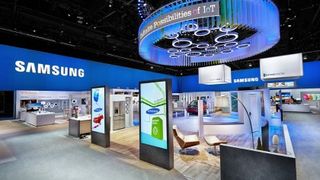
For Samsung, the Internet of Things is a massive deal and will, by 2020, be present in everything the company sells. This is important because Samsung sells much more than just smartphones, and implanting the internet, and therefore connectedness, into these utilities will be a big boost for the industry.
On the software side, Samsung has launched a host of initiatives aimed at getting developers interested in automating certain processes and connecting a fridge, freezer, and so on to the internet.
Samsung Artik, which launched earlier this year, aims to do just that by putting the hardware – a tiny circuit board – and software together in a friendly package that can be played around with. The company is offering three versions: 1, 5, and 10, which increase in power and size as you would expect.
Beyond this, Samsung already sells a range of internet-connected gadgets under the brand SmartThings. The hardware, which ranges from locks to speakers to light bulbs, is controlled by a Samsung device, putting IoT into the hands of mainstream users.
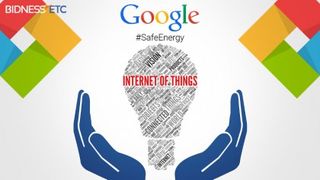
As you would expect, Google has a hand in everything IoT thanks to Android and various projects it has rolled out over the past year.
Project Brillo, for instance, is one such initiative and forms the backbone of many devices. The company has partnered with Intel, Qualcomm, NXP, and others to put Brillo into everything. The software aims to be available on the most devices possible to the most people – as is Google's want – and so it works with virtually every type of architecture and hardware.
Google's Cloud Platform is the other half of this equation, offering extensive data on IoT devices along with security, which is important. The software is focused on gleaning insights from devices which can then be used to work out trends and so on.
Amazon
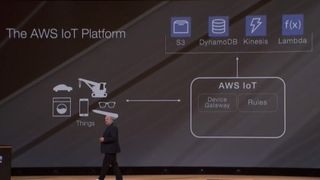
Amazon, too, has a vested interest in IoT thanks to Amazon Web Services, the arm of the company that provides cloud services and hosting to almost every startup under the sun.
The AWS IoT Platform, launched last year, is a range of software that can be used to mine data, secure devices, build out features, and host software, among other things. The platform is, above all else, aimed at making things easier for developers.
Thanks to the massive infrastructure AWS boasts, Amazon can handle billions of messages, requests, and other data between IoT devices and the apps that control them. For a developer, this is a Godsend as it means that the complicated work of getting everything going – and keeping it going – is handled by a competent third-party.
The platform comes in multiple tiers that are, by and large, cheaper than competitors and even includes a free tier.
Bosch

You may associate Bosch with machines that have moving parts, but much of the company's work is now focused on automating appliances.
The Bosch IoT Suite is, as you might expect, a range of software and services that can host, run, secure, and do pretty much anything else with a connected gadget. Bosch describes the suite as a toolbox from which developers can build and it seems to be working.
The company also has a cloud project, called Bosch IoT Cloud, which comes as part of the suite and can be used to host applications, let them communicate, and get the data to the end-user. Security and trust are paramount, according to Bosch, and the software emphasises this.
The biggest advantage, however, is that Bosch can build its software right into the hardware it already makes – and that consumers like – meaning that its IoT ambitions are based in reality, rather than being a hypothetical piece of software.
Intel
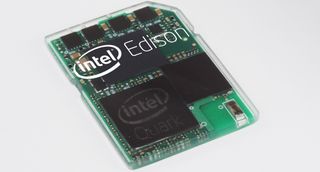
Intel recently announced a change of plan and a shift away from making smartphone chips – an area it never really excelled in – and into IoT and other enterprise-level activities.
The Intel Inside branding, which was used with Windows PCs for years, is rearing its head again thanks to IoT, and the company offers a variety of different hardware and software solutions which can be used on top of the offerings from Microsoft or Amazon.
Essentially, Intel wants to be the processing backbone behind IoT devices.
To do this, Intel has made a series of tiny chips that can be used inside a device, providing a relatively powerful level of performance and also reliability. Windows 10, which boasts many IoT-friendly features, can be used on these processors, increasing its attractiveness to developers and manufacturers.
Apple
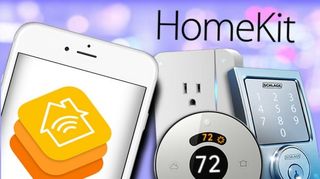
You likely wouldn't think of Apple, a company famous for the iPhone, as having a big hand in IoT, but it does, just not by that name.
HomeKit, launched a few years ago, is the core of Apple's offerings and can, as the name suggests, be used to automate a house alongside compatible gadgets.
The company has been quite tentative with its offerings so far, but there are rumours that a dedicated HomeKit app will be included in iOS 10, putting the software front-and-centre for iPhone and iPad users.
As is Apple's mission, HomeKit is easy and simple to use, acting as a front-end to the hardware and software made by the other companies we've already mentioned.
- Also check out our round-up of the best IoT gadgets
Max Slater-Robins has been writing about technology for nearly a decade at various outlets, covering the rise of the technology giants, trends in enterprise and SaaS companies, and much more besides. Originally from Suffolk, he currently lives in London and likes a good night out and walks in the countryside.
Most Popular




